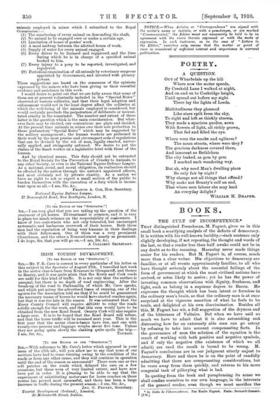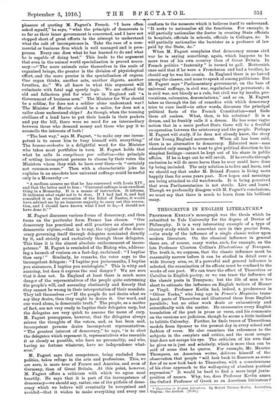BOOKS.
THE CULT OF INCOMPETENCE.*
THAT distinguished Frenchman, M. Faguet, gives us in this small book a scarifying analysis of the defects of democracy. It is written with his well-known lucidity,--each sentence only slightly developing, if not repeating, the thought and words of the last, so that a reader less than half awake could not be in any doubt as to the meaning. Macaulay never made things easier for his readers. But M. Faguet is, of course, much more than a clear writer. His objections to democracy are familiar, or at all events approximately familiar, to all who have thought seriously about the essential failings of the form of government at which the most civilised nations have arrived, or setm likely to arrive ; yet he has the power of investing common observations with dignity, freshness, and light, such as belong in a supreme degree to Bacon. He expresses the thought which has been latent or formless in the ordinary man's brain, so that the ordinary man is at once surprised at the vigorous assertion of what he feels to be truth, and delighted at his own discrimination. Besides all this, M. Faguet has wit, a full suggestion of the dryness and of the bitterness of Voltaire. But when we have said so. much we have to admit that it is also astonishing and distressing how far an extremely able man can go astray by refusing to take into account compensating facts. In the governance of man the solution of the equation is the result of working with both positive and negative symbols, and if only the negative (the existence of which we all admit) are used the result is bound to be wrong. M. Faguet's conclusions are in our judgment utterly unjust to democracy. Here and there be is on the point of candidly admitting that there are compensating considerations, but he veers away from them quickly, and returns to his more congenial task of pillorying what is bad.
In quoting from the book and paraphrasing its sense we shall confine ourselves to our own language, in the interests of the general reader, even though we must sacrifice the • Le Cate de rIncompiterece. Par Emile Fagnet. Paris; Bernard Grasset. p fr.]
pleasure of quoting IL Fagnet's French. "I have often asked myself," he says, "what the principle of democrats is so far as their inner government is concerned, and I have not stopped short of great efforts in the attempt to understand what the cult of incompetence is. Take the case of a com- mercial or business firm which is well managed and is pros- perous. Every one does what he has learned to do and what he is capable of doing best." This leads to the argument that even in the animal world specialisation is proved neces- sary :—" The more animals raise themselves in the scale of organised beings, the greater is the division of physiological effort, and the more precise is the specialisation of organs. One organ thinks, another acts, another digests, another breathes, &c." We all know in what this argument will culminate with fatal and speedy logic. We are offered the old and fallacious pia for what we in England call "a Government of business men." The Minister for War should be a soldier, for does not a soldier alone understand war? The Minister of Marine should be a sailor, for does not a sailor alone understand ships As though, when the teeming civilians of a land have to put their hands in their pockets and pay the bill, there were no need for an intermediary between those who demand money and those who pay it to reconcile the interests of both !
"The best way," says M. Faguet, "to make any one incom- petent is to cause him to busy himself with everything." The homme-orchestre is a delightful word for the Minister
who takes most portfolios in turn. M. Faguet holds that
what he calls /a competence par collation—the principle of setting incompetent persons to choose by their votes the Ministers whom they wish to have over them—is "certainly
not common-sense." Then with a characteristic joke he explains in an anecdote how universal suffrage could be useful only in a Monarchy
"A medium assures me that he has conversed with Louis XIV., and that the latter said to him : Universal suffrage is an excellent thing in a Monarchy. It is a means of instruction. It informs. It indicates what ought not to be done. If I had had it, and had consulted it on the revocation of the Edict of Nantes, it would have advised me by an immense majority to carry out this revoca- tion, and I should have known what I had to do,—I should not have done it.'" M. Faguet discusses various forms of democracy, and then turns on the particular form France has chosen. "Oar
democracy has practised and still practises an almost pure democratic regime,—that is to say, the regime of the demo- cracy governing itself through delegates nominated directly by it, and strictly and exclusively through these delegates.
This time it is the almost absolute enthronement of incom- petence!' M. Faguet is reminded of the Bishop who, address- ing a haunch of venison on a fast-day, exclaimed : "I baptise thee carp!" Similarly, he remarks, the voter says to the incompetent delegate : "I baptise you jurisconsults, I baptise you statesmen, I baptise you sociologists." This is witty and amusing, but does it express the real danger ? We are sure that it does not. In England at least there is much more
danger of the representatives of the people quite outrunning the people's will, and assuming obstinately and fiercely that they cannot be wrong in their interpretation of their mandate.
They tell themselves :—" If the people do not desire what we say they desire, then they ought to desire it. Our word, and our word alone, is democratic truth." The people, as a matter of fact, are not very ready to baptise their delegates carp, but the delegates are very quick to assume the name of carp. M. Faguet presupposes, however, that the delegates always mirror the thoughts of the voters, and, as has been said, incompetent persons desire incompetent representatives. The greatest interest of democracy," he says, "is to elect the delegates which represent it, representatives who resemble it as closely as possible, who have no personality, and who, having no fortune whatever, have no independence what- ever."
IL Faguet says that competence, being excluded from politics, takes refuge in the arts and professions. This, we are sure, is more true of France and America, and even of Germany, than of Great Britain. At this point, however, IL Faguet offers a criticism with which we agree most
heartily. He says that it is part of the incompetence of demooracy—we should say, rather, one of the pitfalls of demo- cracy which we believe will eventually be recognised and avoided—that it wishes to make everything and every one
conform to the measure which it believes itself to understand. "It seeks to nationalise all the functions. For example, it will partially nationalise the doctor in creating State officials in hospitals, officials in schools, officials in Colleges, &c. It will partially nationalise the barrister as a professor of law paid by the State, &c."
When M. Faguet complains that democracy means civil war he is saying something, again, which happens to be more true of his own country than of Great Britain. In French politics " fraternity " is turned to gall. Metternich once said that if he were a Frenchman and had a brother, he should say he was his cousin. In England there is no hatred among the classes, and none to speak of among politicians. But M. Faguet says "Parliamentary government, on the base of universal suffrage, is civil war, regularised yet permanent; it is civil war, not bloody as a rule, but civil war by insults, pro- vocations, calumnies, denunciations," and so on. M. Faguet takes us through the list of remedies with which democracy tries to cure itself—in other words, discusses the principal political facts of the French Constitution—and finds them all useless. What, then, is his solution? It is a dream, and he frankly calls it a dream. He has some vague notion that in a more perfect State there will be a fruitful co-operation between the aristocracy and the people. Perhaps M. Faguet will study, if he does not already know, the story of the Young England movement. When all has been said, there is no alternative to democracy. Educated man—man educated only enough to want to give political direction to his simplest feelings—cannot be kept out of his share in public affairs. If he is kept out he will revolt. If he revolts through exclusion he will do more harm than he ever could have done by being included. The only solution is to live and learn, and we should say that under M. Briand France is living more happily than for some years past. New hopes and meanings are being attached to old watchwords. It is being perceived that even Parliamentarism is not sterile. Live and learn ! Though we profoundly disagree with M. Faguet's conclusions, we must say that there is much to learn from his brilliant essay.











































 Previous page
Previous page